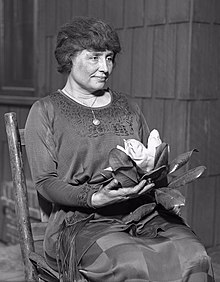
Back Helen Keller Afrikaans هيلين كيلر Arabic هيلين كيلير ARZ হেলেন কেলাৰ Assamese Helen Keller AST Helen Keller AVK Helen Keller Azerbaijani هلن کلر AZB Helen Keller BAT-SMG Helen Keller BCL
Helen Keller | |
|---|---|
 Keller holding a magnolia, c. 1920 | |
| Born | Helen Adams Keller June 27, 1880 Tuscumbia, Alabama, U.S. |
| Died | June 1, 1968 (aged 87) Easton, Connecticut, U.S. |
| Resting place | Washington National Cathedral |
| Occupation |
|
| Education | Radcliffe College (BA) |
| Notable works | The Story of My Life (1903) |
| Signature | |
Helen Adams Keller (June 27, 1880 – June 1, 1968) was an American author, disability rights advocate, political activist and lecturer. Born in West Tuscumbia, Alabama, she lost her sight and her hearing after a bout of illness when she was 19 months old. She then communicated primarily using home signs until the age of seven, when she met her first teacher and life-long companion Anne Sullivan. Sullivan taught Keller language, including reading and writing. After an education at both specialist and mainstream schools, Keller attended Radcliffe College of Harvard University and became the first deafblind person in the United States to earn a Bachelor of Arts degree.[1]
Keller was also a prolific author, writing 14 books and hundreds of speeches and essays on topics ranging from animals to Mahatma Gandhi.[2] Keller campaigned for those with disabilities, for women's suffrage, labor rights, and world peace. In 1909, she joined the Socialist Party of America (SPA). She was a founding member of the American Civil Liberties Union (ACLU).[3]
Keller's autobiography, The Story of My Life (1903), publicized her education and life with Sullivan. It was adapted as a play by William Gibson, and this was also adapted as a film under the same title, The Miracle Worker. Her birthplace has been designated and preserved as a National Historic Landmark. Since 1954 it has been operated as a house museum[4] and sponsors an annual "Helen Keller Day".[citation needed]
- ^ "Deaf, Blind Woman to Get College Degree". The New York Times. June 6, 1983. ISSN 0362-4331. Retrieved April 14, 2023.
- ^ "Speeches, Helen Keller Archive at the American Foundation for the Blind". Archived from the original on December 18, 2021. Retrieved December 23, 2020.
- ^ Aneja, Arpita; Waxman, Olivia B. (December 15, 2020). "The Helen Keller You Didn't Learn About in School". Time. Retrieved April 14, 2023.
- ^ "Helen Keller Birthplace". Helen Keller Birthplace Foundation, Inc. Archived from the original on February 22, 2011. Retrieved January 13, 2005.
© MMXXIII Rich X Search. We shall prevail. All rights reserved. Rich X Search